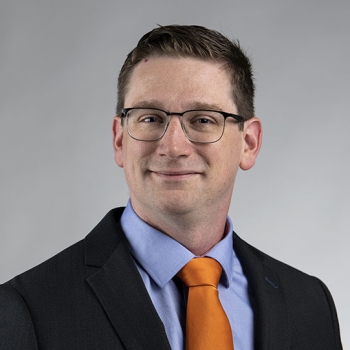Mark H. Weir, PhD
Interim Associate Dean of Research
Associate Professor
Core Faculty, Ohio State Sustainability Institute
Administration and Environmental Health Sciences

Biography
Dr. Weir is an environmental engineer with a research specialization in mathematical and computational methods for health risk assessment. He is most interested in preventing cancer by understanding the mechanisms of its formation and progression. He brings his expertise in the following to characterize and intervene on risks of cancer in diverse populations: chemical and microbial dose-response modeling, risk assessment for human exposures to chemical and biological (microbial) carcinogenic hazards in the built environment, mathematical and computational methods development addressing risk model uncertainty, and how to design and incorporate sustainability-focused infrastructure into the built environment without adversely impacting, but enhancing human health.
Dr. Weir’s current research program engages artificial intelligence-driven risk monitoring for cancer susceptibility from disinfection byproducts and other chemical co-exposures in hospital water systems, modeling of human exposures to mixtures of contaminants with an emphasis on the interaction cascade of gastric carcinogenesis, Helicobacter pylori infection and arsenic exposure in drinking water, and investigating the preclinical in-vitro dose-response of gastric cells and organoids following exposure to mixtures of Helicobacter pylori and inorganic arsenic.
Education
- PhD
- Environmental Engineering, Drexel University, 2009
- BS
- Environmental Engineering, Wilkes University, 2004
Research interests
Building water systems and healthy indoor spaces, Sustainability and risk assessment, Risk analysis methodology, Cumulative risk assessment, Water treatment and wastewater reuse
Select publications
- Ma, Daniel, Weir, M.H., and Natalie M. Hull. (2023) “Fluence-Based QMRA Model for Bacterial Photorepair and Regrowth in Drinking Water after Decentralized UV Disinfection.” Water Research 231 (March 1, 2023): 119612. https://doi.org/10.1016/j.watres.2023.119612.
- Weir, M.H., Traven A. Wood, and Amy Zimmer-Faust. (2021) “Development of Methods to Estimate Microcystins Removal and Water Treatment Resiliency Using Mechanistic Risk Modelling.” Water Research 190 (February 15, 2021): 116763. https://doi.org/10.1016/j.watres.2020.116763.
- Weir, M.H., Alexis L. Mraz, and Jade Mitchell. (2020) “An Advanced Risk Modeling Method to Estimate Legionellosis Risks Within a Diverse Population.” Water 12, no. 1: 43. https://doi.org/10.3390/w12010043.
- Weir, M.H. (2019) “A Data Simulation Method to Optimize a Mechanistic Dose-Response Model for Viral Loads of Hepatitis A.” Microbial Risk Analysis, November 22, 2019, 100102. https://doi.org/10.1016/j.mran.2019.100102.
- Adhikari, Umesh, Alexandre Chabrelie, Weir, M.H., Kevin Boehnke, Erica McKenzie, Luisa Ikner, Meng Wang, et al. (2019) “A Case Study Evaluating the Risk of Infection from Middle Eastern Respiratory Syndrome Coronavirus (MERS-CoV) in a Hospital Setting Through Bioaerosols.” Risk Analysis 39, no. 12: 2608–24. https://doi.org/10.1111/risa.13389.
- Mraz, A.L. Weir,M.H. (2018) Knowledge to Predict Pathogens: Legionella pneumophila Lifecycle Critical Review Part I Uptake into Host Cells. Water. 102:132
- Hamilton, K.A., Chen, A., Johnson, E.dG., Gitter, A., Kozak, A., Niquice, C., Zimmer-Faust, A.G., Weir,M.H., Mitchell, J., Gurian, P. (2018) Salmonella risks due to consumption of aquaculture-produced shrimp. Microbial Risk Analysis.
- Weir,M.H., Mraz, A.L., Nappier, S., Haas, C.N. (2018) Dose Response Models for Eastern, Western and Venezuelan Encephalitis Viruses in Mice - Part II: Quantification of the Effects of Host Age on the Dose Response. Microbial Risk Assessment.
- Hamilton, Kerry A., Weir, M.H., and Charles N. Haas. (2017) “Dose Response Models and a Quantitative Microbial Risk Assessment Framework for the Mycobacterium Avium Complex That Account for Recent Developments in Molecular Biology, Taxonomy, and Epidemiology.” Water Research 109 (February 1, 2017): 310–26. https://doi.org/10.1016/j.watres.2016.11.053.
- Rosen MB, Pokhrel LR, Weir MH. A discussion about public health, lead and Legionella pneumophila in drinking water supplies in the United States. Sci Total Environ. (2017) Jul 15;590-591:843-852. doi: 10.1016/j.scitotenv.2017.02.164. Epub 2017 Mar 10.
Courses
In the news
Gov. Mike DeWine warns that COVID-19 spread could increase as temperatures drop
The Columbus Dispatch